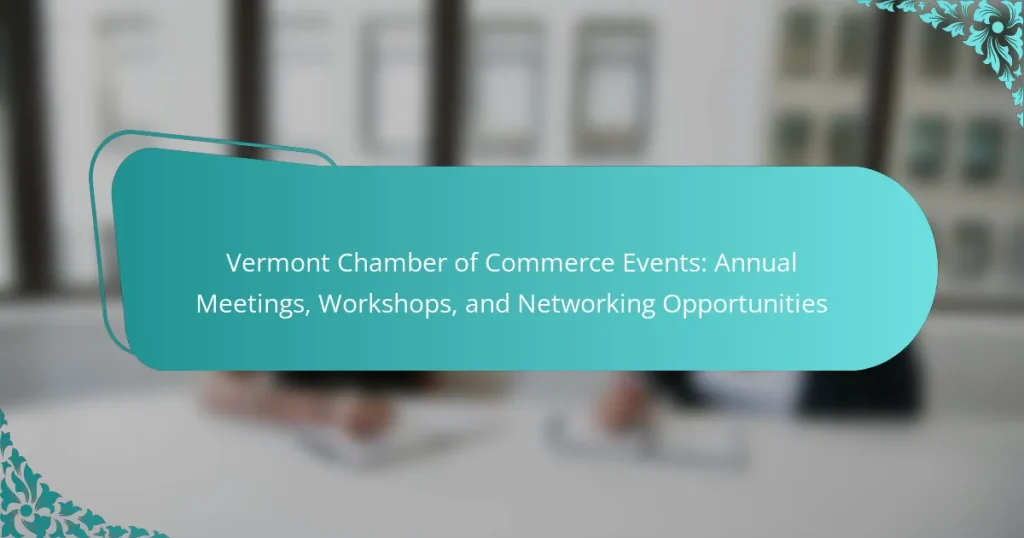The Vermont Chamber of Commerce organizes events that promote networking and professional development for local businesses. These events include annual meetings, workshops, and seminars, providing opportunities for collaboration and insights from industry leaders. Annual meetings focus on communication among members, featuring structured agendas that cover financial reports, board elections, and strategic planning. Workshops and networking events are designed to enhance member interaction and resource sharing, fostering a sense of community among Vermont businesses. The Chamber’s initiatives aim to support economic growth and transparency within the local business environment.

What are Vermont Chamber of Commerce Events?
Vermont Chamber of Commerce Events are organized gatherings that facilitate networking and professional development. These events include annual meetings, workshops, and seminars. They provide opportunities for local businesses to connect and collaborate. Participants can gain insights from industry leaders and experts. Events often feature keynote speakers and panel discussions. Networking opportunities allow attendees to build relationships within the community. The Vermont Chamber of Commerce aims to support economic growth through these events. They also promote collaboration among various sectors in Vermont.
How do Vermont Chamber of Commerce Events benefit local businesses?
Vermont Chamber of Commerce events benefit local businesses by providing networking opportunities. These events facilitate connections between business owners, potential clients, and industry leaders. Local businesses can share resources and collaborate on projects. Workshops at these events offer valuable skills and knowledge to enhance business operations. Annual meetings provide insights into economic trends and legislative changes. Participation can lead to increased visibility within the community. Engaging with the Chamber helps businesses access support services and advocacy. Overall, these events promote growth and sustainability for local enterprises.
What types of businesses typically participate in these events?
Businesses that typically participate in Vermont Chamber of Commerce events include local retailers, service providers, and manufacturers. These businesses often seek networking opportunities to connect with other local entrepreneurs. Additionally, technology firms and non-profits frequently engage in these events to promote collaboration. Educational institutions also join to foster partnerships with local businesses. According to the Vermont Chamber of Commerce, participation helps businesses enhance visibility and build community relationships. This active involvement supports economic development within the region.
How do these events foster community engagement?
Vermont Chamber of Commerce events foster community engagement by bringing together local businesses and residents. These gatherings create spaces for networking and collaboration. Participants share ideas and resources, enhancing local business connections. Workshops provide educational opportunities that empower attendees with new skills. Annual meetings celebrate community achievements and set future goals. Networking opportunities encourage partnerships that benefit the local economy. Research shows that community events can increase civic participation by 30%. Engaging in these events builds a sense of belonging among participants.
What are the key types of events organized by the Vermont Chamber of Commerce?
The Vermont Chamber of Commerce organizes several key types of events. These include annual meetings, workshops, and networking opportunities. Annual meetings typically focus on strategic planning and member engagement. Workshops provide educational resources on various business topics. Networking events facilitate connections among local businesses and professionals. Each event type aims to support business growth and community engagement. These events are designed to enhance collaboration within Vermont’s business landscape.
What are the main features of Annual Meetings?
Annual meetings serve as formal gatherings for organizations to discuss key issues. They typically include presentations from leadership, financial reports, and strategic planning sessions. Attendees often have opportunities for networking and collaboration. Voting on important matters, such as board elections, is a common feature. Annual meetings also provide a platform for member engagement and feedback. They usually take place once a year, allowing organizations to review progress and set future goals. These meetings are essential for transparency and accountability within the organization.
How do Workshops contribute to professional development?
Workshops contribute to professional development by providing targeted skill enhancement. They offer participants practical knowledge that can be immediately applied in their careers. Workshops facilitate networking opportunities, allowing attendees to connect with industry peers. This connection can lead to mentorship and collaboration, further enriching professional growth. Research shows that hands-on training increases retention of information by 75%. Additionally, workshops often feature industry experts who share insights and best practices. This access to expert knowledge helps professionals stay current in their fields. Overall, workshops are an effective method for continuous learning and development in a professional context.
What networking opportunities are available through these events?
Vermont Chamber of Commerce events provide various networking opportunities. Attendees can connect with local business leaders and industry experts. Annual meetings facilitate discussions on economic trends and initiatives. Workshops allow for skill development and collaboration among participants. Networking sessions encourage relationship-building in a relaxed environment. Additionally, events often feature guest speakers who share insights and experiences. These interactions foster partnerships and potential business collaborations. Overall, the events create a platform for meaningful connections within the Vermont business community.

How are Annual Meetings structured and what is their purpose?
Annual meetings are structured to facilitate communication and decision-making among members. They typically include a formal agenda, which outlines topics for discussion. Common elements of the agenda are financial reports, election of board members, and strategic planning sessions.
The purpose of annual meetings is to review the organization’s performance over the past year. They provide an opportunity for members to engage with leadership and ask questions. Additionally, these meetings foster networking among members. They help in setting goals and priorities for the upcoming year.
Annual meetings also serve as a platform for sharing achievements and challenges. They promote transparency and accountability within the organization. This structure ensures that all members have a voice in the decision-making process.
What topics are typically covered during Annual Meetings?
Annual Meetings typically cover organizational updates, financial reports, and strategic planning. They often include discussions on member engagement and community initiatives. Keynote speakers may address industry trends and challenges. Networking opportunities are also a significant focus. Resolutions and voting on board members are common agenda items. These meetings provide a platform for feedback and collaboration among members.
Who are the key speakers at these meetings?
The key speakers at Vermont Chamber of Commerce events typically include industry leaders, government officials, and influential business figures. These speakers are chosen for their expertise and relevance to the topics discussed. For instance, past events featured the Governor of Vermont and prominent CEOs from major local companies. Their participation provides valuable insights into economic trends and business strategies. This selection of speakers ensures that attendees gain practical knowledge and networking opportunities.
How do attendees benefit from the information shared?
Attendees benefit from the information shared by gaining valuable insights and knowledge relevant to their industries. This information can include best practices, market trends, and innovative strategies. Sharing this knowledge fosters networking opportunities among attendees. Attendees can establish connections that may lead to future collaborations. Additionally, the information shared often includes expert opinions and case studies. This real-world context enhances understanding and applicability of the concepts discussed. Furthermore, attendees may receive resources such as handouts or digital materials for further reference. Overall, the shared information equips attendees with tools to improve their business operations and decision-making processes.
What is the role of Workshops in Vermont Chamber of Commerce Events?
Workshops in Vermont Chamber of Commerce events serve to educate and empower local businesses. They provide practical skills and knowledge relevant to current market trends. These sessions often feature industry experts who share insights and best practices. Workshops also facilitate networking among participants, fostering collaboration and community building. According to the Vermont Chamber, these events enhance professional development and drive economic growth. They often address specific challenges faced by businesses in Vermont, offering tailored solutions. Overall, workshops are a vital component of the Chamber’s mission to support and strengthen the business community.
What types of skills or knowledge do Workshops focus on?
Workshops focus on practical skills and specialized knowledge relevant to business development. They often cover topics such as leadership, marketing strategies, financial management, and customer service. Workshops may also include training in technology tools and software applications. These sessions aim to enhance participants’ professional capabilities. Evidence shows that skill-based workshops can lead to improved job performance and career advancement. According to a study by the American Society for Training and Development, organizations that invest in training see a 24% higher profit margin.
How are Workshops tailored to meet the needs of participants?
Workshops are tailored to meet the needs of participants through customized content and interactive formats. The Vermont Chamber of Commerce conducts surveys to assess participant interests and skill levels. This data informs the development of relevant topics and materials. Workshops also include hands-on activities that engage participants actively. Feedback mechanisms are established to refine future sessions. Facilitators adjust their teaching methods based on real-time participant engagement. This adaptive approach ensures that workshops remain relevant and beneficial. By focusing on participant needs, the Vermont Chamber enhances learning outcomes and satisfaction.

What networking opportunities are provided by the Vermont Chamber of Commerce?
The Vermont Chamber of Commerce provides various networking opportunities. These include annual meetings that facilitate connections among members. The Chamber also hosts workshops focused on professional development and collaboration. Networking events are organized regularly to encourage member interaction. Additionally, the Chamber offers online networking platforms for broader engagement. These opportunities help businesses build relationships and share resources. The Chamber’s events are designed to foster community among local businesses.
How do networking events facilitate connections among businesses?
Networking events facilitate connections among businesses by providing a structured environment for interaction. These events encourage face-to-face meetings, which foster personal relationships. Attendees can share ideas and resources directly, enhancing collaboration opportunities. Networking events often include presentations and discussions that highlight industry trends. This knowledge sharing can lead to partnerships and joint ventures. Furthermore, attendees can exchange contact information easily, enabling future communication. Statistics show that 85% of jobs are filled through networking, underscoring its importance. Overall, networking events serve as a catalyst for business growth and collaboration.
What strategies can attendees use to maximize their networking experience?
Attendees can maximize their networking experience by preparing in advance. Researching attendees and speakers can provide valuable insights. Setting clear networking goals helps focus interactions. Practicing an elevator pitch ensures effective self-introduction. Engaging in conversations with open-ended questions fosters deeper connections. Following up with contacts after the event solidifies relationships. Utilizing social media platforms enhances ongoing communication. Attending workshops and breakout sessions facilitates targeted networking opportunities. These strategies are proven effective in enhancing networking outcomes at events.
What are the best practices for participating in Vermont Chamber of Commerce Events?
To effectively participate in Vermont Chamber of Commerce events, attendees should prepare in advance. Research the event agenda and speakers to identify relevant topics. Networking is essential; bring business cards to facilitate connections. Engage actively during discussions to enhance visibility. Follow up with new contacts after the event to solidify relationships. Attend multiple events to build familiarity and trust within the community. Utilize social media to share experiences and promote the event. These practices enhance participation and maximize benefits from the events.
How can businesses prepare for Annual Meetings and Workshops?
Businesses can prepare for Annual Meetings and Workshops by establishing clear objectives. They should define the purpose of the meeting or workshop in advance. This helps guide the agenda and discussions. Next, businesses should create a detailed agenda that outlines topics and time allocations. This ensures that all relevant matters are addressed efficiently.
Additionally, businesses should gather necessary materials in advance. This includes presentations, reports, and any other documentation needed for discussions. Sending out pre-meeting materials to participants helps them come prepared.
Organizing logistics is also essential. This involves securing a suitable venue, arranging for technology needs, and providing catering if necessary. Confirming attendance and sending reminders ensures higher participation rates.
Lastly, businesses should follow up after the meeting or workshop. Collecting feedback helps improve future events. Documenting key takeaways and action items ensures accountability and progress.
What follow-up actions should participants take after networking events?
Participants should send follow-up emails to individuals they met at networking events. This action helps reinforce connections made during the event. In the email, participants can express gratitude for the conversation. They should mention specific topics discussed to personalize the message. Participants can also share relevant resources or information that may interest their contacts. Scheduling a follow-up call or meeting is beneficial for deeper engagement. According to a study by the Harvard Business Review, timely follow-ups improve networking outcomes significantly. Engaging with contacts on social media platforms can further strengthen relationships developed during the event.
Vermont Chamber of Commerce Events are organized gatherings designed to enhance networking and professional development for local businesses. The article covers the various types of events, including annual meetings, workshops, and networking opportunities, highlighting their benefits such as skill enhancement, community engagement, and collaboration among businesses. Key features of these events include insights from industry leaders, structured agendas for annual meetings, and targeted workshops that address specific business challenges. Additionally, strategies for maximizing participation and follow-up actions post-events are discussed, emphasizing the importance of building relationships within the Vermont business community.


